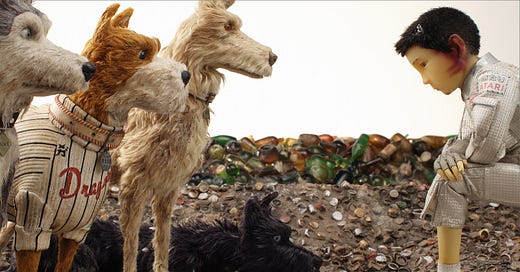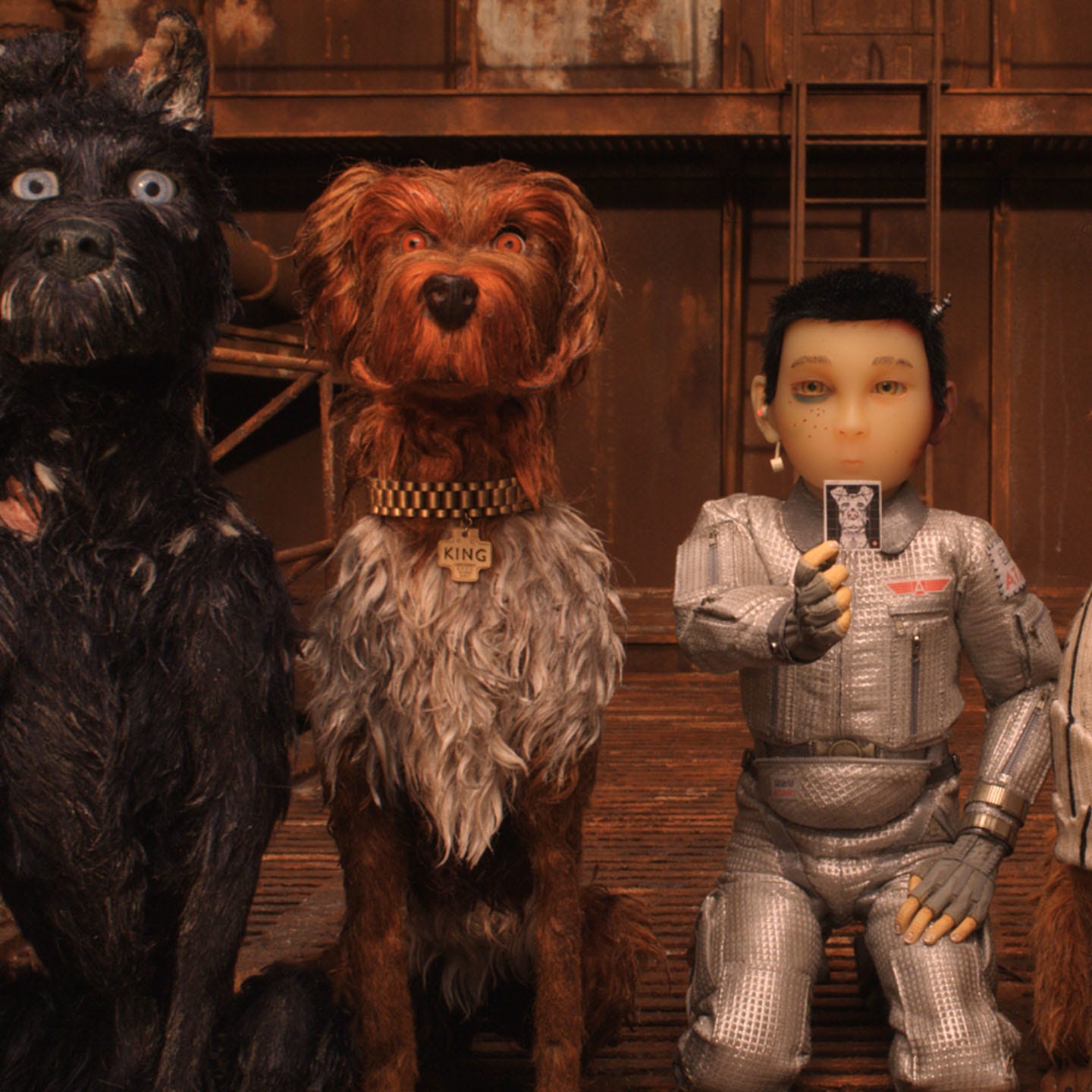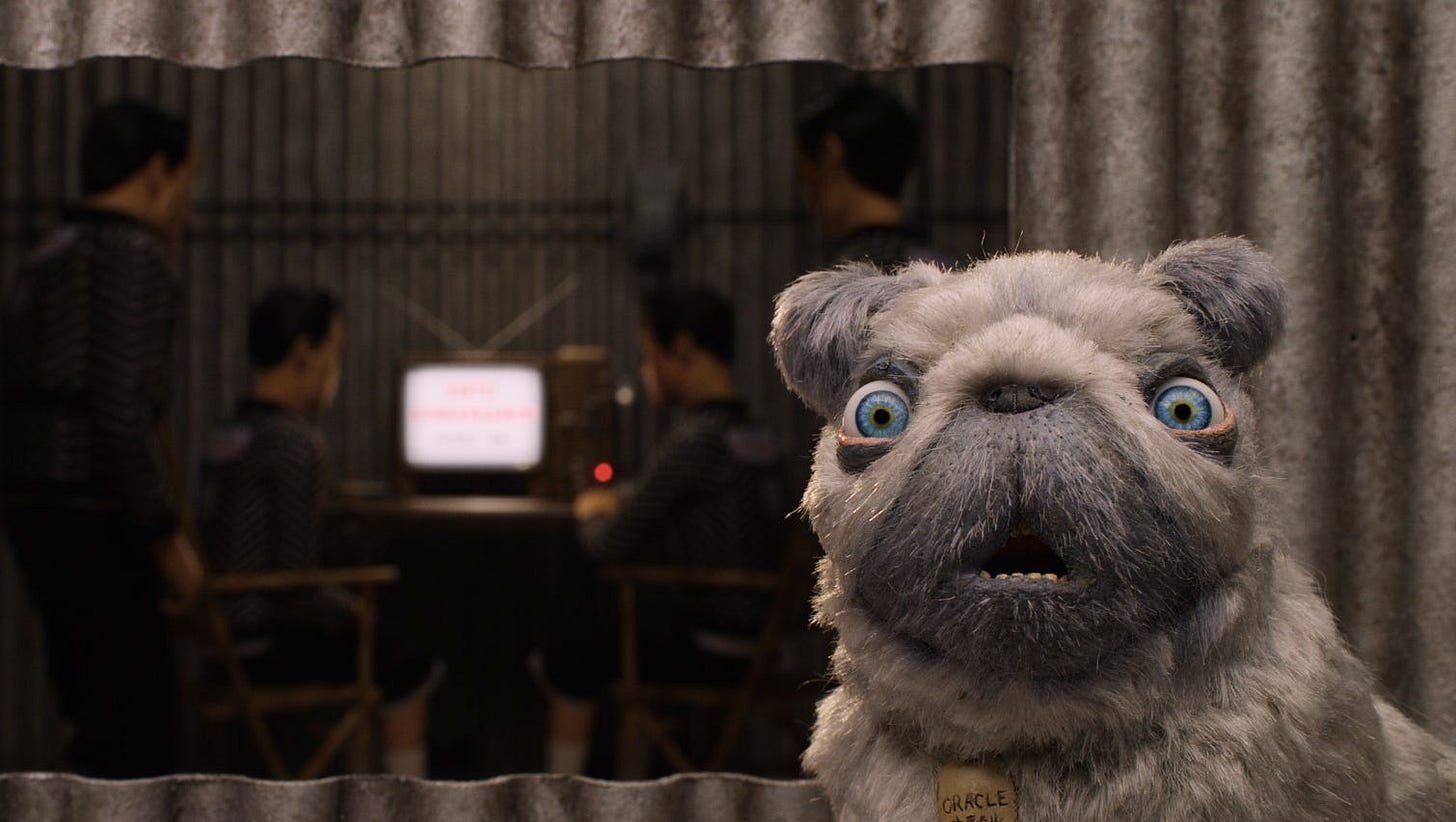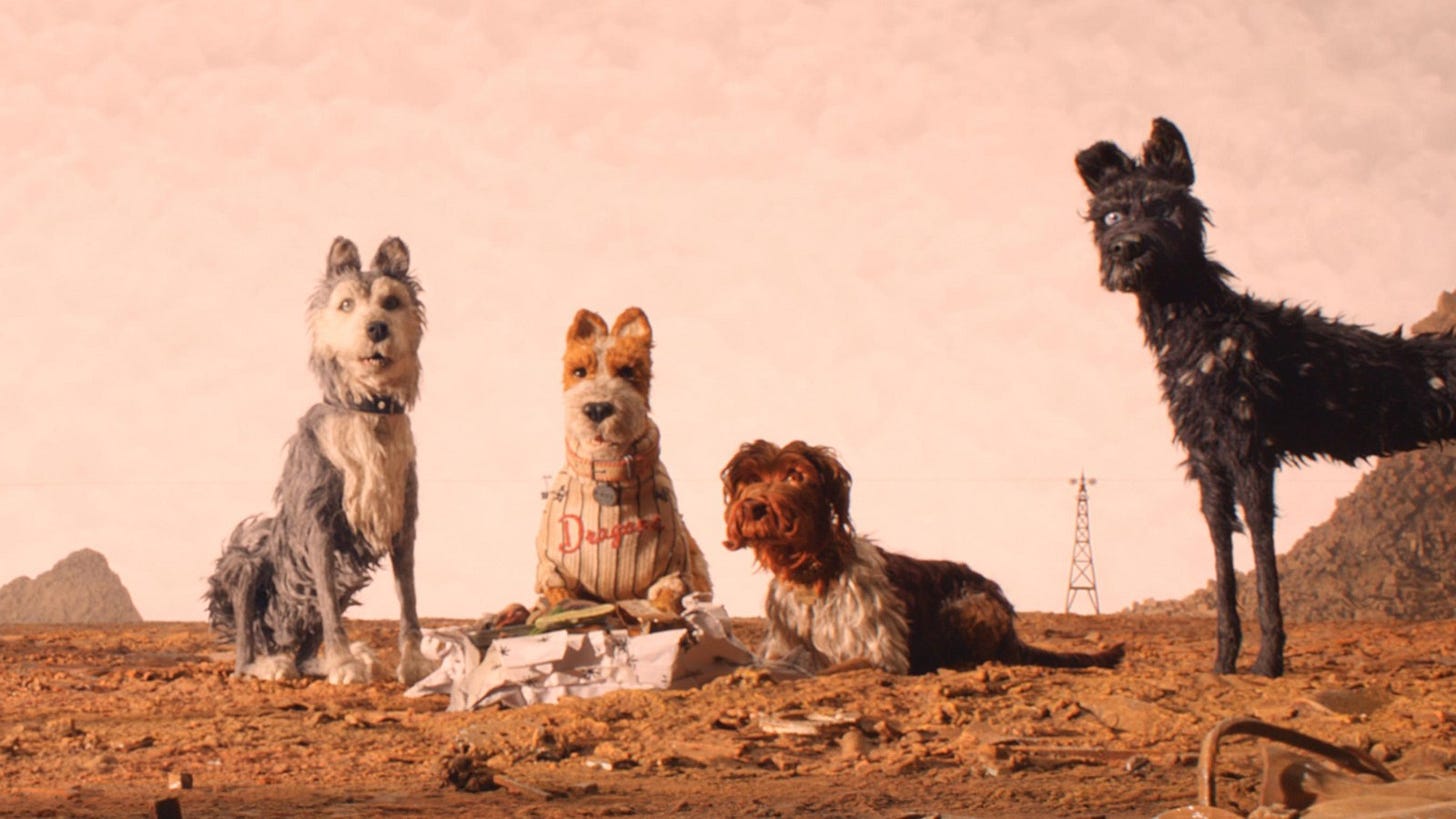I have a special place in my heart for Wes Anderson. I was a boy when I sneaked into “Rushmore” during it’ early 1999 wide release expansion, and it spoke to me in a language I had never before heard. Since then, I’ve been excited every time I enter a new Anderson diorama, As the years have gone by, Anderson’s contemporaries have evolved, or devolved, in different directions. Today, he is maybe the last humanist filmmaker in America. Maybe I’m just a certain age. But sometimes I tire of these big mainstream American films that feel like they have no faith in people, to either make the moral decision or to even fret over the moral decision. For Anderson, after all the comedic pratfalls and miscommunications, typically his characters love each other, in one way or another.
So of course America’s last humanist filmmaker now makes a movie about dogs. “Isle Of Dogs” is the second Anderson stop-motion-animated film after 2009’s delightful “The Fantastic Mr. Fox”. That film was derived from a Roald Dahl story, however, but this effort is developed from an original story courtesy of Anderson, regular collaborators Jason Schwartzman and Roman Coppola, and renaissance man Kunichi Nomura, a writer who previously filled a brief part in “The Grand Budapest Hotel” and presumably brought not only a new flavor to the usual Anderson stew, but also a cultural specificity given that “Isle Of Dogs” is set in Japan, though specifically in Megasaki, a pretty cool-sounding place that unfortunately isn’t real.
I’ll come out and say it: I was in the tank for this immediately. Within the media coverage I read while I was in prison, someone mentioned Anderson’s use of the song “I Won’t Hurt You” by the West Coast Pop Art Experimental Band in the movie. I went to the MP3 kiosks and looked this one up – somehow it was there. No disrespect intended to the West Coast Pop Art Experimental Band, but once I heard the song, I realized, yes – this is absolutely the sort of song you’d hear in an Anderson movie. It occurs to me Anderson is part of a very specific set of American filmmakers that mine pop culture to find great older songs and media to utilize. Most of them have kept making great movies, but they’ve slowly been tracking down less and less evocative older media to exploit. Anderson doesn’t seem to have this problem. “I Won’t Hurt You” is a small well of emotion, slowly bubbling for a little over two minutes.
“I Won’t Hurt You” also feels like a mission statement for this ambitious sci-fi narrative. To say it is about dogs, or even humans, is to neglect that this is a movie about relationships, particularly between the vulnerable. It’s 2038, and a canine flu has swept through Megasaki. The dogs have now been banished to Trash Island, in several cases against the wishes of their owners. As is typically the case, this is the ruling of an autocratic mayor in an election year, against a candidate who vows he can cure the disease.
In the absence of humans, the dogs have become their own rambunctious but civil society. These are Wes Anderson characters, so they’re cultured and mannered even as they acknowledge their own impulsiveness as, essentially, wild animals. It’s both hilarious and warmly endearing that these dogs could be at each others’ throats but preternaturally worried about talking over each other, misrepresenting each other, or getting aggressive under inaccurate pretenses. Such polite dogs! Anyone who sees this who likes dogs would immediately have the juvenile thought, perhaps buried in the back of their head, thinking, I would like to be friends with these dogs!
Atari is the boy venturing out to Trash Island to locate Spots, his dalmatian and bodyguard. However, when he crash-lands, he ends up at the mercy of the packs of dogs that may or may not know how to find Spots. Two journeys, paralleled. On Trash Island, Spots and Atari seek a reunion. And in Megasaki, a young child American journalist begins to suspect (with the help of her friend, Yoko Ono!) that the dog flu may be a smokescreen and it’s the mayor who has ill intentions for the wild dogs of Trash Island.
This beautiful little movie broke my heart. Stop motion animation is a time-consuming endeavor, so it’s just enough to know everything you’re seeing wears a fingerprint. But the character designs of each little furry pup are gorgeous, careful not to overdo the typical “small-mouth-big-eye” trope that naturally pulls the heartstrings. But the human designs are also so odd and unique, from the scar on Atari’s face to the light freckles dotting the face of journalist Tracy. But there are also the voices.
A word about these voices. For decades, animated movies very specifically used talented voice actors, people who knew how to give performances without being seen. At some point, studios realized there were extra box office dollars to be had by putting famous names on the poster, though I can’t think of a single kid who decided to see “Robots” because Ewan McGregor does a shaky American accent to voice the lead. Now, when you close your eyes and listen to some of these movies, you might recognize the superstar, but you can also tell when they’re exaggerating sloppily, as if to convey “This is my animated voice.”
“Isle Of Dogs” has a typically-stacked Wes Anderson cast, including the likes of Bryan Cranston, Jeff Goldblum, Greta Gerwig, Scarlett Johansson, Bill Murray, Courtney B. Vance, Ken Watanabe, I could go on, and we’d be here all day. But everyone is giving a real performance, even if they might be playing a dog. You could close your eyes and you would believe you’re hearing a movie about real human concerns. Anderson and his collaborators have gotten soft voice work from his day players, delicate, humane voicework that accentuates both the laughs and the humanity of such a storyline.
I talked about those dog-on-dog conflicts played out, and how delightful I found it. I missed that. You don’t see any of that in prison, and in fact, you’d better watch how you speak. Literally everyone has a chip on their shoulder, as you’d expect. There is no such thing as a friendly disagreement. You can’t turn to someone else and say, “Respectfully, my man, you’re wrong on that point.” You can’t point out where someone went wrong, and you definitely can’t point out where someone made a mistake.
Everyone is several heads deep, which is about insecurity as much as it’s about status. So when you disagree with someone beyond a superficial back-and-forth, it becomes a four-act play with possibly an intermission. Because in real life, how do most arguments end between opinionated and/or hard-headed men? It ends up that someone has somewhere else to go. Well, that ain’t prison, especially during the pandemic. Worst case scenario, you’ll be starting a conflict that may NEVER end, either trivial or otherwise. Best case scenario, you’ve encountered one of those fragile nobodies not prepared to be questioned, and they will just crumble where they stand in a sweaty, cursing mess. Congratulations, you won.








I don’t usually like animated films of the modern era, but Anderson’s Dahl movie was for me one of the best any-kind-of-films of the modern era. And he’s generally one of the directors that keeps me from writing off this era of film. I’m much more fond of the 40s and 30s, and 70s, but I’m glad we have Anderson playing on our team. It’s hard for me to take opinions seriously when they come from someone who dismisses his films.